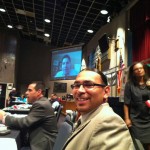Gabe Galanda published an updated version of his paper, "The Business Case for Private Investmentand Development in Indian Country," at the 12th Annual Native Nations Law Symposium that was held on the Kickapoo Reservation in Kansas on September 14th. He added new topics such as several federal Indian Country tax incentives that Congress has allowed to expire, as well as the HEARTH Act. He originally published the paper at RES 2011, at the request of the U.S. Department of the Interior's Office of Indian Energy and Economic Development.
[W]hile state and local governments struggle to make ends meet [amidst the Great Recession], tribal governments have largely avoided economic catastrophe. Fueled by the $26 billion Indian gaming industry, Indian Country is generally faring much better than neighboring local economies since the recession took hold in 2008. Ironically, not having property tax bases to begin with, most tribal governmental revenues have remained stable. Many tribes are avoiding complacency; they recognize that the Indian gaming industry will not sustain its exponential growth over the last decade. The inevitable legalization of Internet gaming and, in some jurisdictions, commercial land-based gaming, will eventually put a major dent in Indian Country’s bottom line. As such, tribal governments are more than ever looking to diversify their economies.
Where tribes bring a staggering array tangibles like land and location, and intangibles like sovereignty, relaxed red tape and tax exemption, their corporate business partners bring proven industry expertise and new capital to the reservation. Whether through a joint venture between a tribe and a non-Indian business, a tribal land lease to a non-tribal company, or a tax credit investment – all of which are contemplated below – there are an abundance of very advantageous reservation development deals for Corporate America to symbiotically explore with tribes at this time in our nation’s history. The time is now for tribes to leverage these advantages to create new economic and job opportunities on their reservations.
Gabriel "Gabe" Galanda is a partner at Galanda Broadman PLLC, of Seattle, an American Indian owned law firm. He is an enrolled member of the Round Valley Indian Tribes of Covelo, California. Gabe assists tribal governments and businesses in all matters of tribal economic development and diversification, including entity formation and related tax strategy. Gabe can be reached at 206.691.3631 or gabe@galandabroadman.com.






